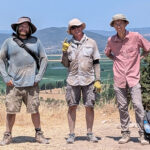
For the last seven weeks, Robert Barry ’25, ancient studies and visual arts, worked in a trench under the sweltering 90-degree sun. It may sound grueling, but this is Barry’s second year working in this archeological site in Greece with Michael F. Lane, associate professor of ancient studies and field director on the Kopaic Cultures, Economies, and Landscapes (KOCECOLA) research program. KOCECOLA is an archaeological investigation of a prehistoric settlement in its physical, human, and historical circumstances in the Kopaic Basin of central mainland Greece. Lane has conducted fieldwork in this area since 2010.
“What I really like about ancient studies is the faculty,” shares Barry. “They show a lot of interest in their students, and I feel like I belong.” Barry has taken archaeology and ancient Greek language classes with Lane, where he has excelled.
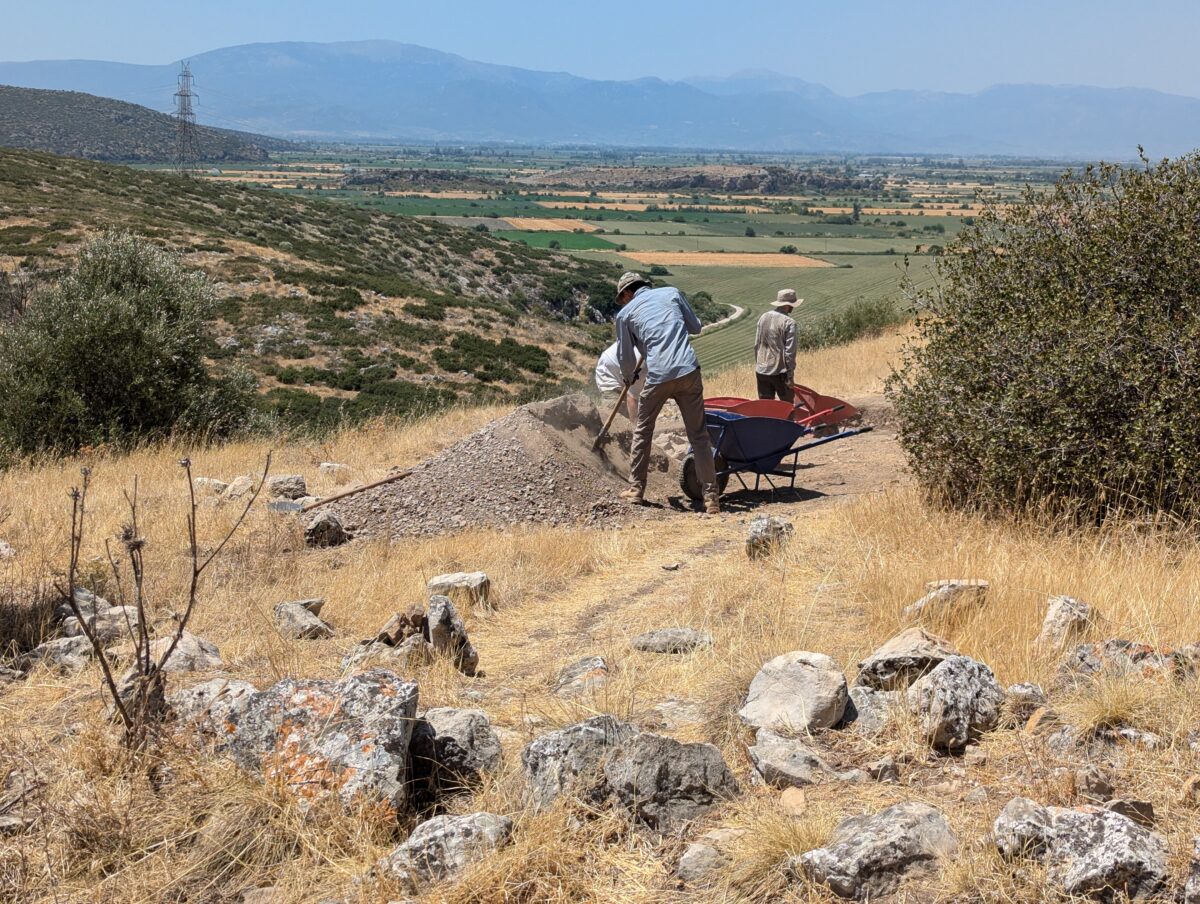 Students at UMBC’s 2024 archeological field school in Greece prepare the site for winter by backfilling trenches with soil. (Michael F. Lane/UMBC)
Students at UMBC’s 2024 archeological field school in Greece prepare the site for winter by backfilling trenches with soil. (Michael F. Lane/UMBC)
Barry learned about the project in Lane’s ancient Greek language class. Lane was seeking undergraduate research assistants to join the 2023 six-week summer archeological fieldwork opportunity, and Barry joined the team. This year, he returned as a trench supervisor with more responsibilities.
From excavating to supervising
Student research assistants use satellite-based differential Global Navigation Satellite Systems (DGNSS) and optical survey equipment. “We use the DGNSS and optical equipment both to plot the location of our trenches and to record the position of discoveries in three dimensions: latitude, longitude, and elevation above sea level,” explains Lane. Once an excavation site is identified, students use trigonometry to measure trenches and then large shovels to reveal distinct layers of soil. Excavation teams are made up of 2 – 3 students spread across six trenches.
“This year, I was a trench supervisor and learned a lot about myself. My priorities changed,” explains Barry. “Last year, I was digging and following directions from my supervisor. Now, I’m giving the orders and having to be responsible for the health and safety of everyone else while getting the job done.”
Lane says the senior staff at KOCECOLA regarded Barry as a peer. “He’s smart, meticulous, punctual, responsible, untiring, even-keeled, good-humored, and funny,” says Lane. “For this reason, I gave him a trench of his own to supervise for the last three weeks this summer, and he exceeded expectations.”
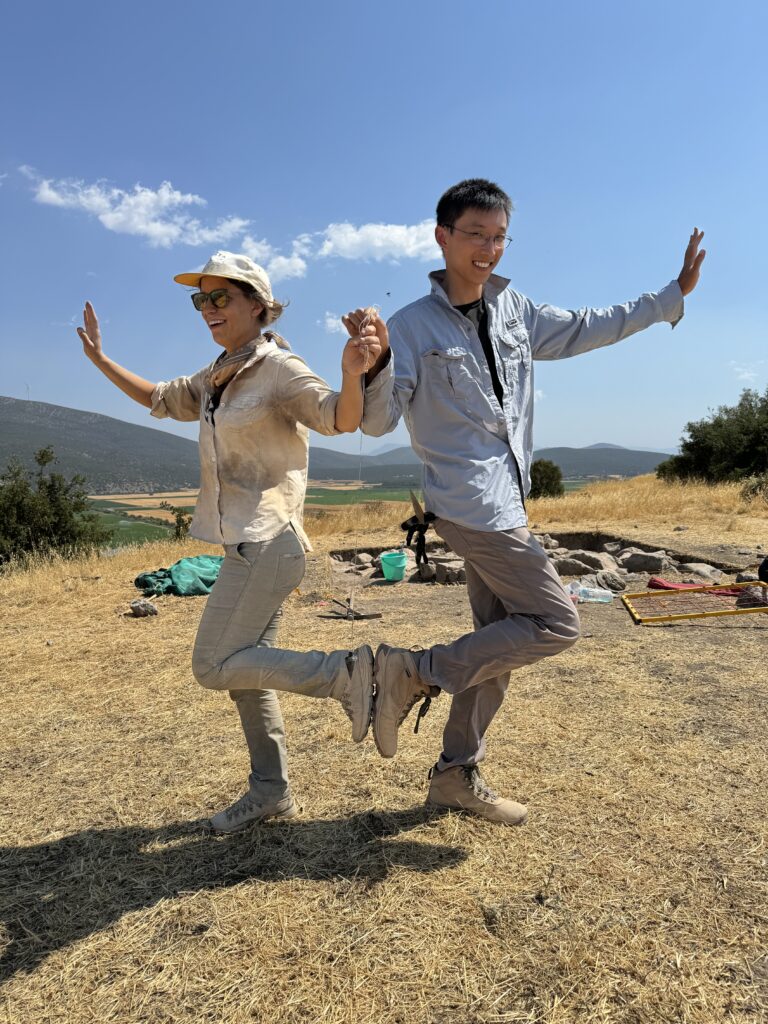 (l-r): Rachel Channell, a crew supervisor from Greece, teaches Barry a traditional Greek dance. (Brady E. Cavanagh/UMBC)
(l-r): Rachel Channell, a crew supervisor from Greece, teaches Barry a traditional Greek dance. (Brady E. Cavanagh/UMBC)
To get the job done, the team’s daily routine meant leaving the village at 5 a.m., taking a 20-minute drive to the dig site, hiking up a mountain, and beginning work around 5:30 a.m. Barry’s team of three students used small hand trowels and brushes to help reveal soil layers and artifacts, such as pottery. A fine mesh screen helped sift the soil removed during excavation, leaving behind finer artifacts. They would take soil samples for scientific dating and chemical analysis, as well as basic soil and sedimentary descriptions. Thanks to a 2024 UMBC Strategic Awards for Research Transitions grant that Lane received, students also had the opportunity to sample for radiocarbon dating and luminescence dating, which measures the energy of photons released from minerals to determine the age of exposed strata.
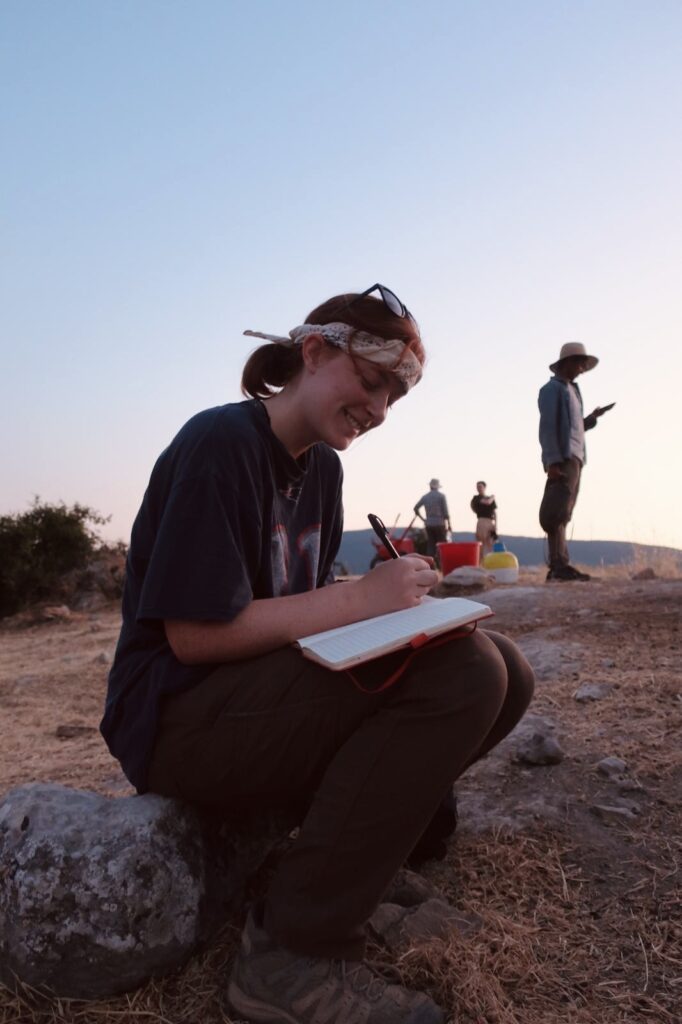 Brady E. Cavanagh ’26, visual arts, documents her work. (Elliott G. Alvey/University of Virginia)
Brady E. Cavanagh ’26, visual arts, documents her work. (Elliott G. Alvey/University of Virginia)
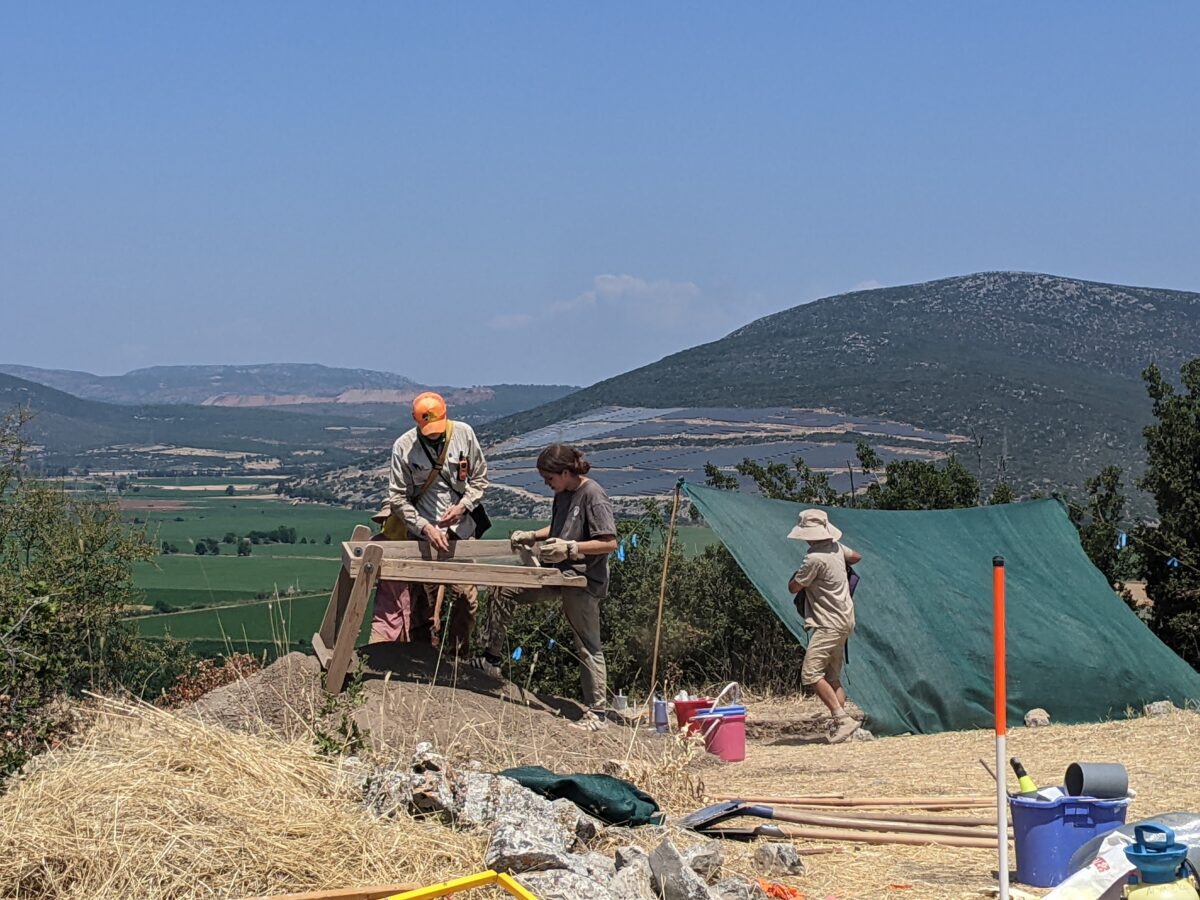 2023 crew screen soil for fine artifacts. (l-r): Damian V. Koropeckyj ’16, global studies, supervises India J. Kelly ’24, history, and Naomi Morales Glen, a master’s student at the University of the Peloponnese in Kalamata, Greece. (Michael F. Lane/UMBC)
2023 crew screen soil for fine artifacts. (l-r): Damian V. Koropeckyj ’16, global studies, supervises India J. Kelly ’24, history, and Naomi Morales Glen, a master’s student at the University of the Peloponnese in Kalamata, Greece. (Michael F. Lane/UMBC)
“We record where each artifact is, define its features and its chronological, historical, cultural, and social contexts,” says Barry. “It can get complicated when there are numerous artifacts to identify, map, excavate, bag, and label.” At 1 p.m., the crew would head to the lab for three hours to wash the day’s finds, scrub them with toothbrushes, and catalog finds. The rest of the afternoon would be all theirs until 8 p.m. when they would gather for a communal dinner at the local taverna (Greek for restaurant).
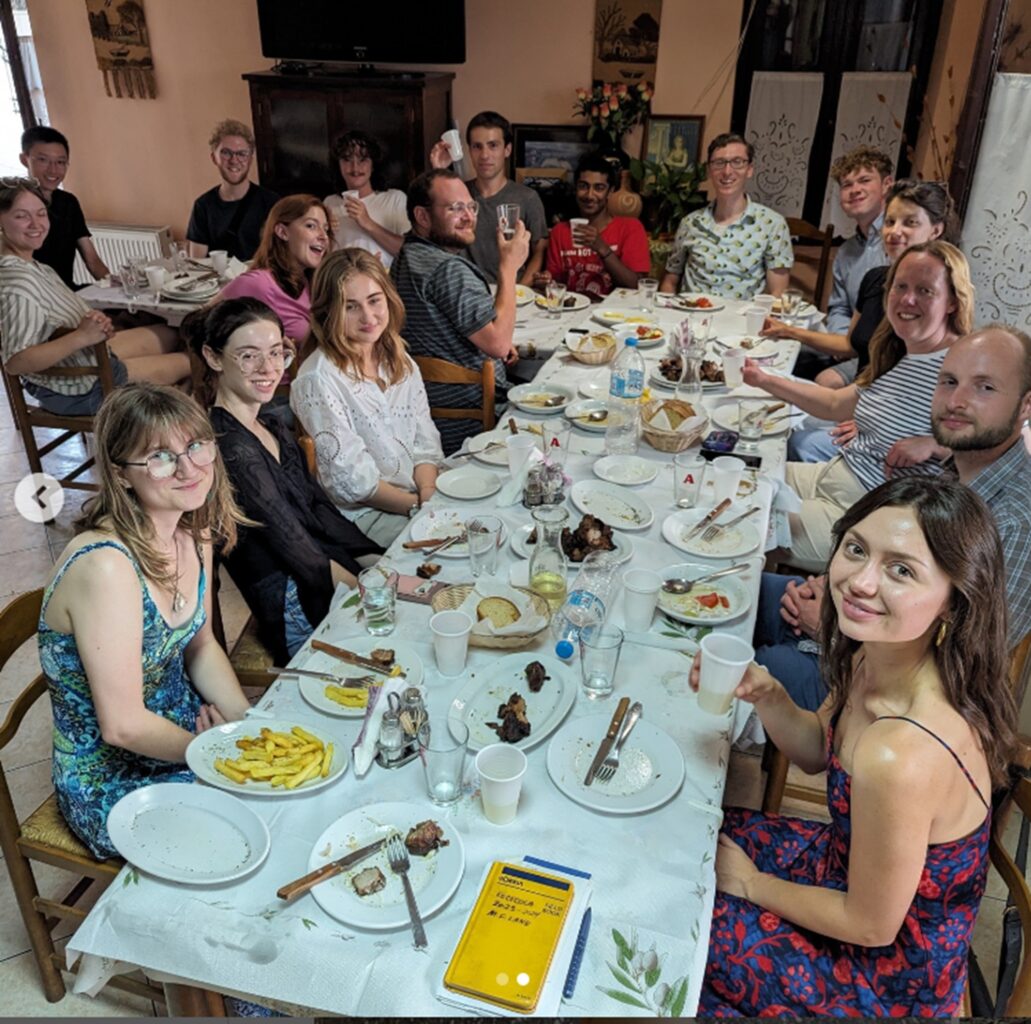 The 2024 crew enjoys dinner in the local village after a long day. (Michael F. Lane/UMBC)
The 2024 crew enjoys dinner in the local village after a long day. (Michael F. Lane/UMBC)
To Greece and beyond
Now that the internship has ended, Barry is sightseeing in Austria before returning to the U.S. “My favorite part of this year’s experience was the international collaboration. I enjoyed getting to know students from the United Kingdom, the Netherlands, Germany, and Greece,” says Barry, who used these opportunities to practice his Greek and Latin skills, which are important in the ancient studies graduate programs he’ll apply to after returning to UMBC.
“Probably the moment that most touched me this summer was when Robert sat down at the kitchen table at the staff house with me and said, ‘Lane, can I tell you something…? I think I want to do this for the rest of my life’,” Lane shares. “I now consider it my duty to help him continue to excel, doing everything in my power to get him into the best academic programs and relevant jobs.”





